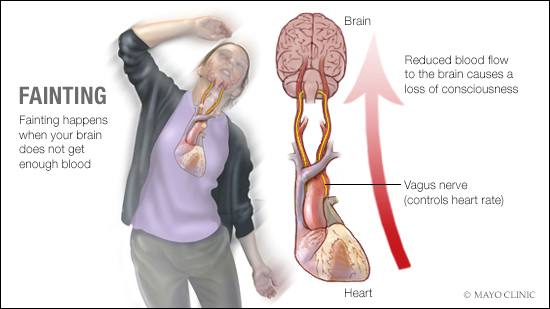-
Cardiovascular
Mayo Clinic Q and A: When does fainting require medical attention?
 DEAR MAYO CLINIC: What causes fainting? Is it always harmless, or can fainting be a sign of a more serious medical problem?
DEAR MAYO CLINIC: What causes fainting? Is it always harmless, or can fainting be a sign of a more serious medical problem?
ANSWER: Fainting happens when your brain doesn’t get enough blood, and that causes you to briefly lose consciousness. In many cases, fainting is not a reason for concern. But, in some people — particularly in those with a history of heart problems or those who faint while exercising — fainting may be caused by a more serious underlying medical condition. In those cases, a health care provider should assess it as soon as possible.
One of the most common reasons people faint is in reaction to an emotional trigger. For example, the sight of blood, or extreme excitement, anxiety or fear, may cause some people to faint. This condition is called vasovagal syncope.
Vasovagal syncope happens when the part of your nervous system that controls your heart rate and blood pressure overreacts to an emotional trigger. Your heart rate slows, and your blood vessels widen. In turn, that causes your blood pressure to drop. When that happens, your body cannot deliver the blood your brain needs, and you lose consciousness.
This kind of fainting doesn’t require treatment. Because fainting is more likely when standing up, though, to prevent fainting, it can be useful for people prone to vasovagal syncope to lie down or sit down with their heads between their knees if they begin to feel lightheaded or dizzy.
Another kind of fainting can happen when you stand up from sitting or lying down, and your blood pressure drops quickly. This causes dizziness, lightheadedness or a brief loss of consciousness. This is called orthostatic hypotension. It’s typically not a serious condition. Orthostatic hypotension often is caused by something that’s easily resolved, such as dehydration or being overheated.
However, if orthostatic hypotension happens regularly, especially if you lose consciousness, see your health care provider. In that case, it could be a side effect of a medication or due to an underlying medical condition, such as a nervous system disorder.
Fainting becomes a more serious concern when it happens to people who have a prior history of a heart attack, people who have had heart surgery, or those who have heart disease or an irregular heart rhythm. In those situations, fainting could be a sign of a heart problem requiring treatment. For people who fall into those categories, discuss any episode of fainting with a health care provider to see if additional evaluation is needed.
It’s also highly uncommon for someone to faint for no reason while doing some type of physical activity or exercise. In particular, sudden fainting without any prior warning signs, such as lightheadedness, dizziness or nausea before a fainting episode, must be assessed by a health care provider. Although rare, young people without a prior history of heart disease may experience fainting as the first clinical symptom of an underlying congenital heart condition.
Finally, if you lose consciousness as a result of a fall or another type of accident, you should be evaluated promptly by a health care provider to ensure that you haven’t sustained a concussion or another head injury. — Dr. Win-Kuang Shen, Cardiovascular Disease, Mayo Clinic, Scottsdale, Arizona







